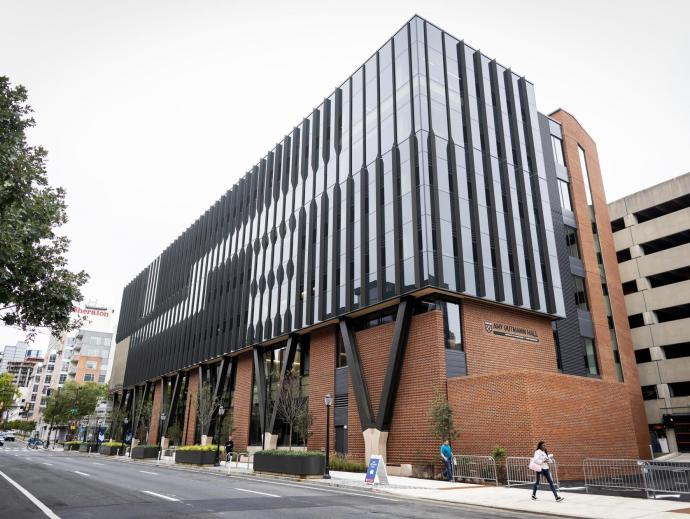Amy Gutmann Hall’s Sustainable Footprint

A model of sustainability, Amy Gutmann Hall is constructed primarily from mass timber, which has a lower carbon footprint than steel or concrete. Housing spaces for both research and teaching, Amy Gutmann Hall was built to train the next generation of scholars to mine data for insights that can be leveraged for the betterment of humanity.
Amy Gutmann Hall’s Sustainable Footprint
A model of sustainability, Amy Gutmann Hall is constructed primarily from mass timber, which has a lower carbon footprint than steel or concrete. Housing spaces for both research and teaching, Amy Gutmann Hall was built to train the next generation of scholars to mine data for insights that can be leveraged for the betterment of humanity.

Housing spaces for both research and teaching, Amy Gutmann Hall was built to train the next generation of scholars to mine data for insights that can be leveraged for the betterment of humanity. A model of sustainability, the building is constructed primarily from mass timber, which has a lower carbon footprint than steel or concrete. The building features energy-efficient systems and low-flow plumbing, cutting energy use by nearly 20% and water usage by 33%.
Dedicated with a ribbon-cutting in fall 2024, Amy Gutmann Hall is the tallest new mass timber building in the Philadelphia region, and, at six stories high and 116,000 square feet, one of the largest mass timber structures on the East Coast. The mass timber construction reduces the building’s carbon footprint by 52% relative to concrete, and 41% relative to steel, and the design includes windows and skylights that provide balanced daylighting and views throughout. A 12,000-square-foot green roof minimizes the building’s heat island effect and impact on wildlife habitats, and the two-story main entrance features a green wall and natural and stained wood finishes. The project is targeting LEED Gold certification.
"At Penn, our spaces show our values to the world. The very construction of Amy Gutmann Hall embodies Penn’s values and commitment to sustainability and wellness,” says Vijay Kumar, Nemirovsky Family Dean of Penn Engineering. “Its novel construction using mass timber, a sustainable, yet remarkably resistant material, sets it apart from any before it at Penn or in the City of Philadelphia. Inside the building, the warmth of the exposed wood throughout creates a welcoming environment for our community, inspiring us to even greater levels of creativity and imagination.”